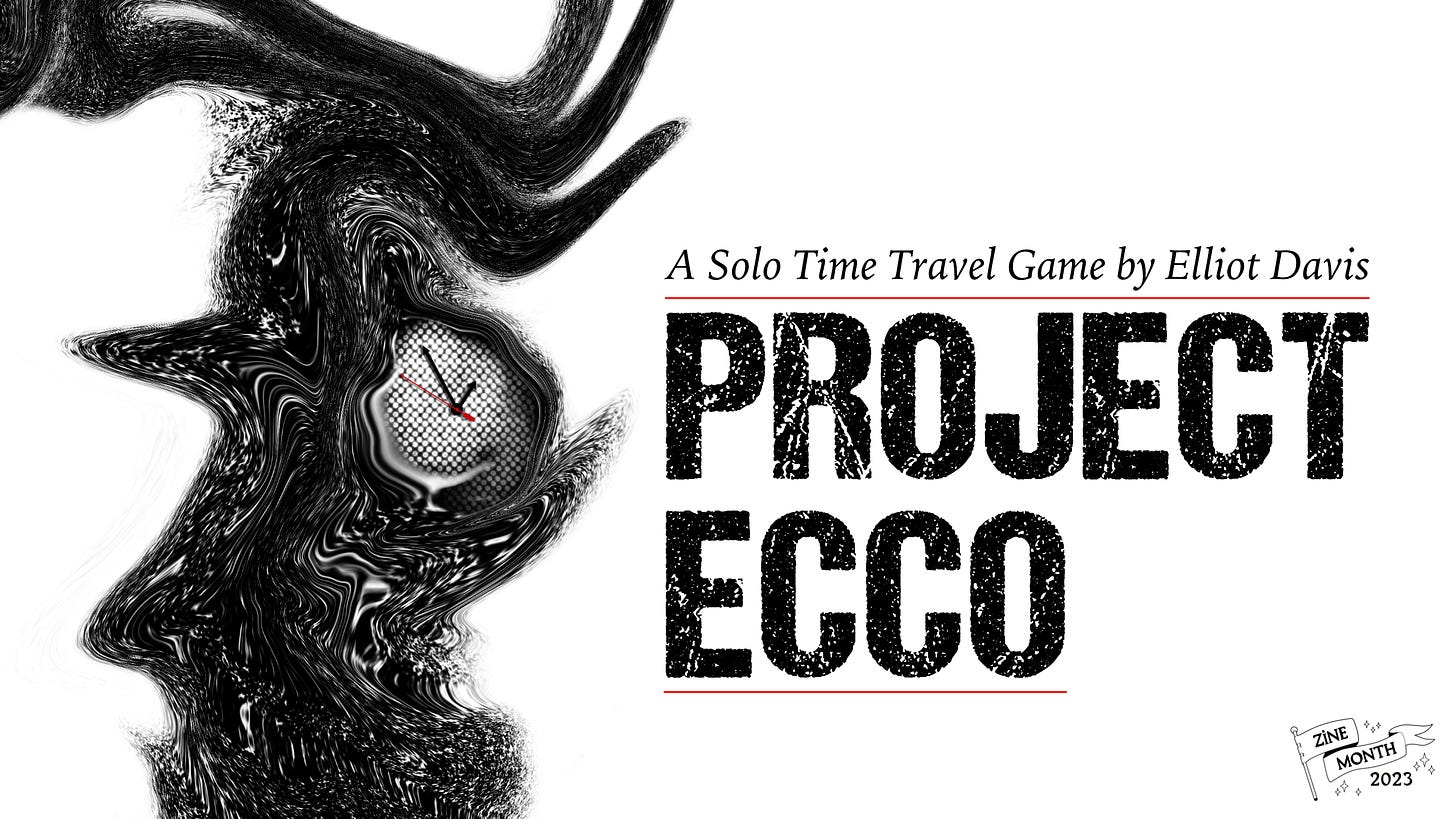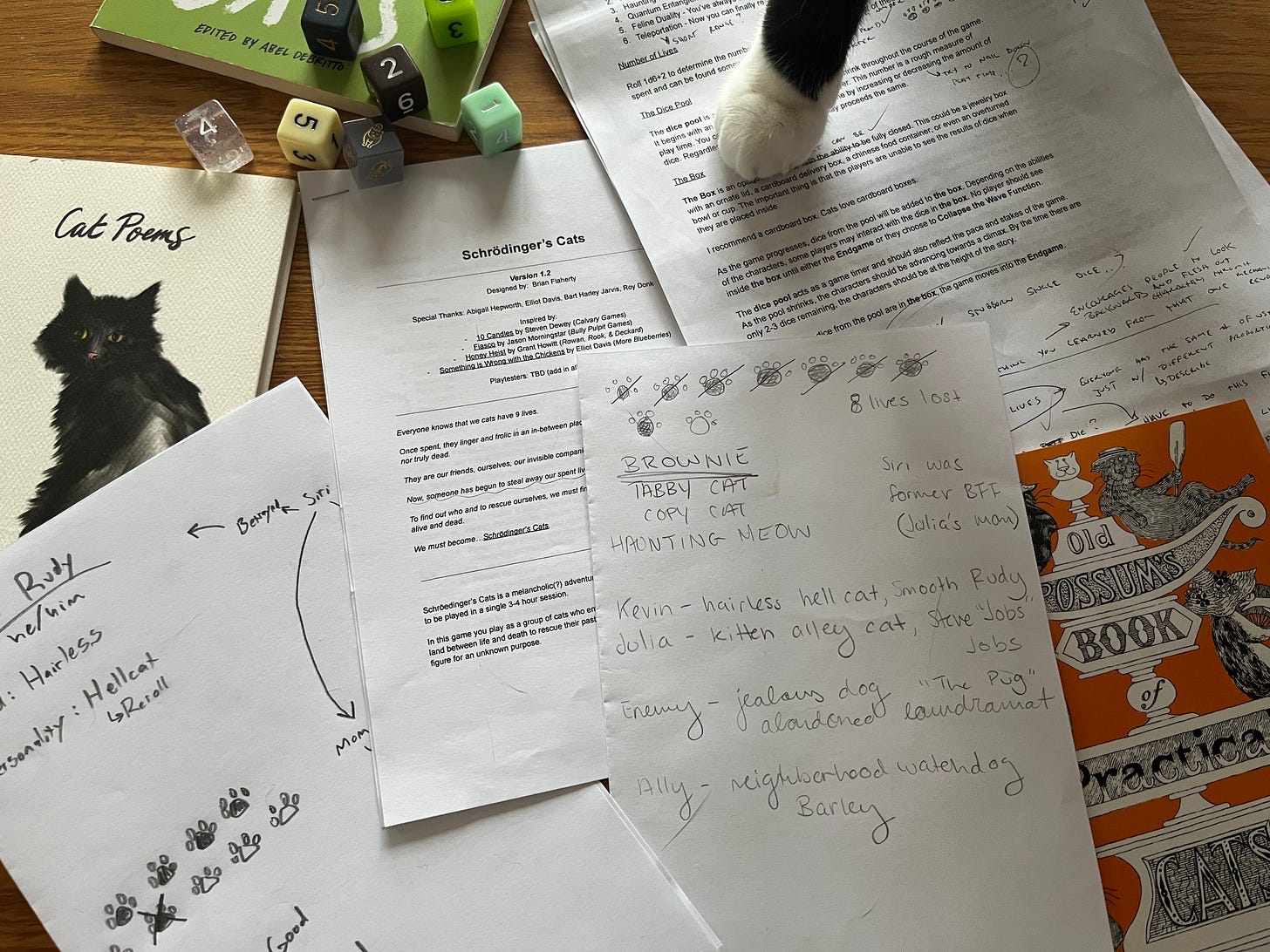This past month Elliot and I got a crash course in every element of game design. Elliot completed his first successful crowdfunding campaign for Project ECCO (Funded over 200%!) and I playtested my latest game Schrödinger's Cats. Now Elliot is focused on publishing and distribution while I turn my focus towards Schrödinger's Cats version 2.0.
Crowdfunding Project ECCO
A Lesson, an Observation, and a Surprise
The campaign for Project ECCO is over and we raised more than double our original goal! I still can’t believe it.
I’d love to turn my experience into something that helps others facing their first campaign. So here are a lesson, an observation, and a surprise from my time crowdfunding.
A Lesson
Don’t let the numbers get the better of you, a.k.a. push back on your greediest impulses. When we reached our goal, I was overjoyed but, candidly, there was also this little voice in the back of my mind saying, “How much higher can we go? How do we get more? MONEY!” The reality is that more money coming in for the cool thing you’re making feels good. I can’t overstate how important it was for me to fight that voice and focus on every new contribution as its own win, not just another coin in the virtual Scrooge McDuck pile.
An Observation
Community is critical. When I first started designing games last year, I kept the TTRPG community at an arm’s length, for no other reason than anxiety around putting myself out there. With this year’s Zine Month, I made a more concerted effort to be a part of this space, to lift other projects up, to collaborate, and to simply have some kind of a presence. It’s made a huge difference, not only for the visibility of the project but for my own sense of wellbeing throughout this process.
A Surprise
This is a vulnerable thing to do. I didn’t quite realize how much of myself I was putting out there in creating this campaign. Belief in the game felt like belief in me. On some level, this is true. People support your project because they think you have the ability to make it a reality, and one they’d like to play at that. This, crucially, does not mean that the opposite is true. A lack of belief in your game is not a lack of belief in you. It’s a hard separation and, honestly, one I sometimes forget.
So, there we are. I know these aren’t the most “actionable” learnings (for those, check out our last issue), but I hope you do get something out of them. And if you ever want to share about your own crowdfunding experience, I’m all ears.
Cheers to a successful Zine Month!
-Elliot
Getting to Version 2
Six Takeaways from the Schrödinger's Cats Playtest
Playtesting your TTRPG is as daunting as it is exciting. Determining what works and, more importantly, what doesn’t, is the biggest hurdle standing between a rough draft and a finished product. Here are six takeaways I learned from my playtest that you can incorporate into your own game design.
1. Always Support the Theme
10 Candles is one of my favorite TTRPGs because every aspect of the rulebook supports the game’s theme. The art, layout, and, most importantly, the mechanics, all serve to heighten the tone it is trying to achieve. In a game that wants to explore tragedy and hopelessness, there is no better mechanic than a slowly shrinking dice pool to perfectly simulate the feelings of inevitably and despair.
When I wrote Schrödinger's Cats I was thinking more about dice mechanics and cat puns than about theme and tone. This resulted in a less-focused rulebook that would ultimately put more burden on the GM, forcing them to find the game’s tone during play rather than providing a strong thematic backbone.
With theme in mind, I plan to focus the game around two things: Quantum Mechanics and Flashbacks. The quantum mechanical elements have already been baked in, but honing them further will amplify the game’s silliest aspects and clarify the tone as “goofy cat fun.” Putting more emphasis on a simplified flashback mechanic will give the players an easier route to connect with their characters and build compelling backstories during play.
2. Simplify, Simplify, Simplify
There is a quote that has been attributed to many people which goes something like, “If I were a better writer, I would have written you a shorter letter.” Brevity is easy to deprioritize in the first draft, but is essential in the second.
For Schrödinger's Cats, this means drastically simplifying the Cat Lives mechanic and reevaluating some of the more convoluted abilities on the Cat Personality table. Every aspect of a roleplaying game should serve the players and the story. Anything that gets in the way of either should be simplified or removed.
3. Make Sure the GM is Supported
All of my favorite TTRPGs take great pains to supply the GM with the tools they need and set them up for success right out of the gate. This can mean many different things: Clear and concise breakdowns of the game mechanics, roll tables to help with worldbuilding, comprehensive indexes. It’s important to remember that any GM who picks up this game does not have the benefit of the hours of thought and consideration you put into the game, they have only what is on the page. Make every word matter.
4. Follow the Fun
Pay attention to when your players are having the most fun, because that’s where your game will find the most success. It may come from where you expected or, as in the case of Schrödinger's Cats, from a secondary game mechanic. I expected the Flashback mechanic to be a cute way for players to fill out their character’s backstories. Instead, it proved to be both poignantly consistent with the theme of past lives and a reliable source of fun and silliness for the players. I shouldn’t be surprised by the success of a mechanic that is so prevalent in other games, but I expect version 2.0 will prioritize that very simple mechanic over something more complicated like the Lives mechanic.
5. Kill your Darlings, Save the Cat
Writers often warn of the dangers of their darlings–the great ideas that no longer fit in their story, but that they love so much they fight to include regardless. It is common knowledge that these favorite children often have a habit of being a poison to the whole. These elements should be removed as quickly as possible. But, paradoxically, it’s also important not to lose sight of what made the idea exciting in the first place.
My Darling is The Box. The Box is my endgame mechanic and is the thematic glue that holds Schrödinger's Cats together. It was the first idea I had for this game and was the reason I started writing it. It was also the biggest failure of the playtest.
I know that it doesn’t belong in the game in its current form, but I also know it’s too fundamental to be lost. The ultimate success of this game will likely lie in how well I solve the problem of The Box, but even now I don’t quite know what that solution is. Is it possible that I am falling prey to the very trap I am warning against?
6. Embrace Collaboration
A playtest is a perfect way to be reminded that all the best ideas come from collaboration. When your players ask to try something outside the rules LET THEM! It may end up becoming a major part of the game.
In the Schrödinger's playtest, the players opted to split up the shared dice pool so each of them rolled a portion of the dice when they were attempting an action as a group. I then improvised the rule that they could only use their Cat Powers on the dice they rolled. And just like that, we accidentally created a great mechanic for group checks that rewards participation and teamwork and also gives each player more chances to use their cool abilities. Now something that didn’t exist at all in the first draft will be a key feature of version 2.0.
With all of these things in mind, I can’t wait to take a red pen to Schrödinger's Cats so I can rebuild it and share with you a much more focused TTRPG to enjoy.
-Brian
Six More ZiMo 2023 Recommendations
We are in the last hours of Zine Month 2023, but there are still plenty of great games looking for support from this awesome community. Check out a few more of our recommendations and hopefully you find a new game to fall in love with.
Broken Cities is a dice-less, GM-less TTRPG in which players take the role of Travelers coming to a City with adventurous goals in mind. Meanwhile, the City wants to convince them to make the sacrifices needed to fix it. You'll like this game if you enjoy surrealism, weird adventures, asymmetrical roles, and urban exploration!
The Ink That Bleeds: How to Play Immersive Journaling Games is all about journaling games — how immersion works, how emotions and experiences can bleed in to and out of the game, why journaling games are having their cultural moment, managing self care, playing your approximate self, seeing worlds as relationships, why writing dialogue is so affecting, and so much more. Read an excerpt at Indie Game Reading Club.
Twelve Years: Demon Lord Expansion is a GM-less TTRPG that you can play solo or with a group. This expansion introduces a new quest, a greater variety of foes, more powerful magicks, and, of course, a new BBEG now unleashed to terrorize the known world.
The Hard Light Dynamic: A CY_BORG Zine is an acid-horror tinged adventure for CY_BORG that plunges its characters into the depths of the multi-level Hardlight Dynamics research and development headquarters. Players will be faced with the slow unravelling of reality as they get closer and closer to their goal: Finally reaching the unhinged AI sequestered at the bottom of the facility.
Ailing Away is a solo mystery game with historical romantic elements. It’s a bit like Clue but it's meant for one player, you get to kiss some of the suspects, and there's no board to set up. Every suspect is a potential friend or romantic partner, but one of them will die at random before the game begins. The player's goal is to find out who killed them and why. Each time players try to learn a secret, they put either their social standing or their precarious health at risk. The consequences for failure can be very high (muddling detectives might be be sent home with tarnished reputations or even die of tuberculosis).
Swamp Troll Witch(es) is a GM-less TTRPG for solo journaling, epistolary play, or small group play based on the Motif framework. Be a troll witch! Brew potions! Live your best troll witch life! The game focuses on the daily lives of the troll witches. The game features simple, flexible, narrative-driven mechanics with non-binary success and a simple oracle for answering questions.
Upcoming Schedule
March 10th - New Interview w/ Taylor Moore (Worlds Beyond Number, Rude Tales of Magic)
Check out our previous two-part interview with Taylor:
March 17th - My First Dungeon: Anamnesis (w/ designer Sam Leigh)
March 24th - My First Dungeon: Anamnesis (Radio Play w/ Brian Flaherty & Abby Hepworth)
March 31st - My First Dungeon: Anamnesis (Talkback w/ designer Sam Leigh)








